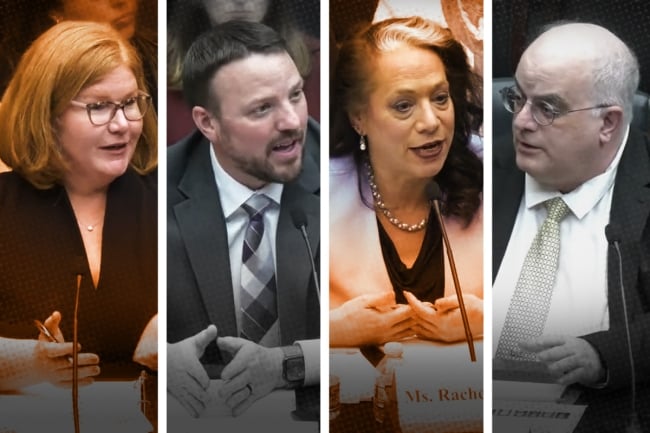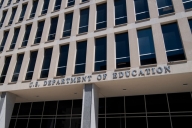You have /5 articles left.
Sign up for a free account or log in.

The witnesses, from left to right: Kim Cook, chief executive officer of the National College Attainment Network; Justin Draeger, president of the National Association of Student Financial Aid Administrators; Rachelle Feldman, vice provost of enrollment at the University of North Carolina at Chapel Hill; and Mark Kantrowitz, a financial aid expert and consultant.
Photo illustration by Justin Morrison/Inside Higher Ed | U.S. House of Representatives Committee on Education and the Workforce
“Disaster.” “Mess.” “Crisis.”
Those were a few terms used by Republicans and Democrats to describe the launch of the new Free Application for Federal Student Aid (FAFSA) during a Wednesday hearing of the House higher education subcommittee that revealed their deep frustrations with the Biden administration’s handling of the project, which has run months behind schedule and been riddled with issues.
“We’ve had 32 years of a functioning system that served hundreds of millions of students and thousands of institutions,” said Utah representative Burgess Owens, the Republican chair of the higher education subcommittee. “Within three years, Biden’s Department of Education has managed to bring the education industry a possible game-changing crisis.”
After the hearing, some Republicans wanted heads to roll. The House Education and Workforce Committee said on social media that “it’s time for Richard Cordray to GO.” Cordray is the chief operating office of the Office of Federal Student Aid, which has overseen the FAFSA overhaul.
Congress ordered the Education Department to simplify and streamline the FAFSA as part of a law passed in 2020 that also expanded eligibility for the Pell Grant for low-income students. The department was initially given two years to complete the task, but the Biden administration received a one-year extension in spring 2021.
The hearing gave college-access advocates and financial aid experts a chance to air their grievances along with committee members. The department has provided vague and ever-changing guidance, they said, along with press releases that seem to sugarcoat the situation.
“We’ve done, undone and redone work more times this year than I can count,” said Rachelle Feldman, vice provost of enrollment at the University of North Carolina at Chapel Hill. “Financial aid professionals and schools feel like the rug keeps getting yanked out from under them.”
What colleges need, Feldman said, is “straight talk and timely solutions” from the department to help students get money for colleges. “Enough with the sunshine and rainbows.”
Currently, FAFSA submissions for the coming academic year are down by about 40 percent compared to the previous year, leading to worries that fewer high school seniors will opt to attend college in the fall. Those who complete the FAFSA are 84 percent more likely to immediately enroll in college, said Kim Cook, a witness and chief executive officer of the National College Attainment Network, which tracks FAFSA data and works to help students get to and through college.
“The data portend a catastrophic decline in college enrollment this fall for the high school class of 2024 unless something changes very quickly,” Cook added. “It is still possible to inject momentum into this FAFSA cycle. Despite the challenges, tireless, fierce student advocates and the students and families they support have rolled the proverbial rock up the hill.”
The department said Tuesday evening, ahead of the hearing, that up to 16 percent of the 7 million applications submitted so far will need to be corrected by a student or family before the Education Department can proceed with processing those forms. That’s on top of about 30 percent that are affected by calculation and tax errors. The department said the students should be able to correct their applications early next week, but fixing the other 30 percent will take more time. It expects to start reprocessing applications affected by a tax error—about 20 percent of those submitted—by May 1. In a typical year, that is the deadline for prospective students to commit to a college and put down deposits.
Until the issues with the form are resolved and colleges can trust that the information they have received is accurate, institutions are holding off on sending aid offers to students.
Feldman testified that UNC has yet to release a single financial aid offer to students because of errors with applications. The department will have to reprocess about 48 percent of the student records the university has received, along with another 20 percent that were rejected and will need to be corrected by students first.
Feldman said she remains hopeful that the changes to the form—and the financial aid system— will eventually remove barriers to higher education for students. But right now, she and other colleagues are discouraged and exhausted, she told the committee.
“We need to find a way to clear the path from political spin and inconsistencies, and empower both the department and schools to move forward with a clear path—one they can communicate with students and families,” she wrote in her written testimony. “We are facing not just a crisis of enrollment, but one of trust which may erode further if improvements are not made.”
‘A Priority Since Day One’
The Education Department was not called to testify in the “FAFSA Fail” hearing. But while it was proceeding, Education Secretary Miguel Cardona faced a separate grilling from lawmakers on a House appropriations subcommittee in a budget hearing. It marked the first time members of Congress have had a chance to directly question Cardona since the FAFSA launch unraveled.
The secretary defended his department’s handling of the project.
“We have to do better for our students and this better FAFSA will get us there, but I do empathize with the challenges and the frustrations that folks are feeling,” Cardona said. “We need to do better, and we’re gonna get better.”
Republicans on the panel pressed Cardona on whether the Biden administration prioritized debt relief efforts over the development and implementation of the new FAFSA, and whether resources were taken away from the project to serve Biden’s political priorities.
Cardona strongly denied those conjectures. “I don’t want you to think they’re not doing FAFSA because they’re working on something else,” he said. “FAFSA has been a priority since day one … It’s not an either/or.”
But in the education hearing, lawmakers and witnesses agreed that debt relief had been a “distraction,” in the words of Mark Kantrowitz, a financial aid expert and consultant who was one of the witnesses.
“You can’t have all hands on deck focusing on the FAFSA when some of them are focused on other aspects,” he said.
Justin Draeger, president of the National Association of Student Financial Aid Administrators, said he’s not sure whether the administration took the FAFSA project seriously enough. But “the evidence speaks for itself,” Draeger said, noting that the department has taken on other tasks along with debt relief, including multiple regulatory overhauls.
“If everything is a priority, any CEO will tell you, you don’t have a strategic roadmap,” he said. “Unfortunately, we are where we are today because this did not rise to the top.”
Calls for Accountability, More Student Support
Wednesday’s hearing clearly will not be the last on FAFSA, as lawmakers, particularly Republicans, pledged to holding the Biden administration accountable. What that potential oversight might look like is not clear, however, and lawmakers sought input from witnesses about potential consequences, including whether somebody should lose their job.
“If there was a financial aid director or college president who delayed financial aid for six months on their campus, the professional price that would be paid would be pretty steep,” Draeger said, not directly answering the question.
For some Republicans, the crisis raises broader questions about the role of the Education Department—and whether it should exist at all.
“It doesn’t make the argument to keep the Education Department any easier,” said Representative Lloyd Smucker, a Republican from Pennsylvania.
Although Democrats on the committee agreed that the FAFSA launch was a mess, they were—not surprisingly—more hesitant to directly criticize the Biden administration. Their questions focused more on how to help this year’s class of students complete the FAFSA form and get access to aid—low-income students, in particular.
“What’s really sad is that this is impacting those who need it the most, because FAFSA is for those who need that financial aid,” said Representative Teresa Leger Fernández of New Mexico. “They need to know whether they are going to get that Pell Grant.”
But Leger Fernández said she didn’t want to be in the “blame game.”
“I want to be in the solution game,” she said. “We need to get those applications back up.”
Virginia representative Bobby Scott, a Democrat who helped pass the law requiring changes to the FAFSA, said the hearing highlighted the need for accountability and to get the project back on track.
“This year’s setbacks continue to jeopardize opportunities for countless students,” he said.
And this spring might not be the end of FAFSA woes. While the department fixes the FAFSA for the Class of 2024, the department is already behind on developing the form for the 2025–26 academic year. By this time of year, the department has usually published a draft version of the application for public comment—a step that hasn’t happened yet. Several witnesses expect delays in the next FAFSA, which is supposed to open Oct. 1.
Liam Knox contributed reporting for this story.




